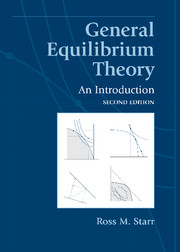Book contents
- Frontmatter
- Contents
- List of illustrations
- Introduction to the second edition
- Preface to the second edition
- Preface to the first edition
- Table of notation
- Table of assumptions
- A General equilibrium theory: Getting acquainted
- B Mathematics
- C An economy with bounded production technology and supply and demand functions
- D An economy with unbounded production technology and supply and demand functions
- E Welfare economics and the scope of markets
- F Bargaining and equilibrium: The core
- G An economy with supply and demand correspondences
- H Standing on the shoulders of giants
- Bibliography
- Index
F - Bargaining and equilibrium: The core
Published online by Cambridge University Press: 05 June 2012
- Frontmatter
- Contents
- List of illustrations
- Introduction to the second edition
- Preface to the second edition
- Preface to the first edition
- Table of notation
- Table of assumptions
- A General equilibrium theory: Getting acquainted
- B Mathematics
- C An economy with bounded production technology and supply and demand functions
- D An economy with unbounded production technology and supply and demand functions
- E Welfare economics and the scope of markets
- F Bargaining and equilibrium: The core
- G An economy with supply and demand correspondences
- H Standing on the shoulders of giants
- Bibliography
- Index
Summary
One of the ideas presented repeatedly to students of economics is the link between large numbers of economic agents and competitive, price-taking, behavior. The notion is that in a large economy individual agents are strategically powerless and hence price-taking behavior makes sense. We can now give a formal proof of this argument. It is presented in Chapters 21 and 22. We define the core of a market economy as a generalization of the idea of the Edgeworth box. There will be many different kinds of traders and the usual N commodities. We will take a limit as the economy becomes large in a stylized fashion. The striking result is that the family of solutions to a bargaining problem corresponding to the contract curve in the Edgeworth box shrinks to the set of competitive allocations. In a large economy, strategic bargaining merely gets you to the competitive equilibrium. We will prove that, in a large economy, individual traders really do lack strategic power. Hence, competitive price taking is the appropriate model of behavior.
- Type
- Chapter
- Information
- General Equilibrium TheoryAn Introduction, pp. 249 - 250Publisher: Cambridge University PressPrint publication year: 2011



